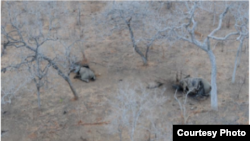Niassa Reserve, one of Africa's largest wildlife parks, is marking a year without losing a single elephant to poachers.
The last elephant killed by poachers in the Mozambique animal preserve was May 17, 2018.
The New-York based Wildlife Conservation Society, which manages the reserve with Mozambique's government and several other partners, credits the achievement to the formation of a rapid response police force that is far better equipped than former game wardens.
The force has access to better weapons, as well as helicopters and a small plane for aerial surveillance. The officers have also been granted the power to arrest poachers or would-be poachers. Tougher laws have also been put into place, including a maximum sentence of 16 years in prison for anyone caught with a weapon inside Niassa's boundaries.
Poaching had drastically reduced the number of elephants in Niassa, from more than 12,000 as recently as 2010 to a little more than 3,600 in 2016.
'Genuine chance for recovery'
The new interventions, with Mozambican President Felipe Nyusi personally authorizing the rapid intervention force, have led partners to hope that Niassa's elephants "stand a genuine chance for recovery,'' the conservation group said.
"It is a major and very important development that poaching has ceased. This represents a major success,'' George Wittemyer, who chairs the scientific board for the Kenya-based organization Save the Elephants, told the AP.
But experts say the rate of annual elephant deaths still exceeds the birth rate. Africa's elephant population has plummeted from several million around 1900 to around 415,000, according to surveys in recent years.





